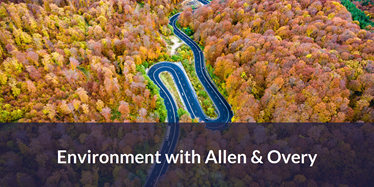In a nutshell
 Environment attorneys advise companies on federal, state and local laws and regulations relating to public health, welfare and the environment. The type of conduct that is regulated includes industrial activity, the development of natural resources, the use of land and everyday activities like driving a car. BigLaw attorneys primarily defend companies that are subject to these laws and regulations.
Environment attorneys advise companies on federal, state and local laws and regulations relating to public health, welfare and the environment. The type of conduct that is regulated includes industrial activity, the development of natural resources, the use of land and everyday activities like driving a car. BigLaw attorneys primarily defend companies that are subject to these laws and regulations.
The laws attorneys work with will depend on the environmental medium: for example, air, water, waste and natural/cultural/historical resources (this touches on historical preservation, land use and endangered species) all have their own statutes and programs. The Clean Air Act – “one of the most complex pieces of legislation on the books,” according to Hunton Andrews Kurth partner Bill Brownell – is one example.
The types of proceedings handled by environmental lawyers are also varied. Administrative agency work involves dealing with agencies. In federal government, that includes the Environmental Protection Agency (EPA), the Department of the Interior (DOI), the Department of Agriculture (DOA), the Department of Energy (DOE) and the Nuclear Regulatory Commission (NRC). Legislative work involves working with Congress and advising companies on federal legislation and lobbying.
"An environmental lawyer will practice before Congress, administrative agencies, federal and state courts, and international tribunals and organizations. The practice of environmental law also involves politically controversial subjects that one reads about in the papers every day." — Hunton Andrews Kurth partner Bill Brownell
What lawyers do
- “I tell students that the practice of environmental law touches on everything a lawyer can do. An environmental lawyer will practice before Congress, administrative agencies, federal and state courts, and international tribunals and organizations. The practice of environmental law also involves politically controversial subjects that one reads about in the papers every day,” says Hunton's Brownell.
- He adds: “When a statute or law is changed it initiates a process that can last for years, from lobbying legislators, to working with agencies that develop rules, to challenging or defending those rules in court, to seeking permits and licenses under those rules, to defending clients in enforcement proceedings.”
Realities of the job
- The laws and regulations have become increasingly complicated over the years. Thus, much of what environmental lawyers do on a daily basis is to “make sure that clients understand all the rules to which they are subject and work with them to ensure they are complying with those rules,” says Hunton Andrews Kurth partner Andrea Field.
- “Often, the first time a client realizes that there’s a problem is when the EPA starts an enforcement action, charging the client with breaking federal law." Because the laws are often unclear, “it is the attorney’s job to determine if legitimate arguments can be made that, in fact, the client has not violated the law. And if there are violations, then it is the lawyer’s job to negotiate a reasonable – and, if possible, nonpunitive – way for the client to come into compliance.”
- This field of law is “constantly changing,” according to Field. “International tribunals, Congress and state legislatures enact complicated laws. That prompts regulators to adopt complicated rules and issue guidance to implement the laws.” And then there are the advocacy groups, which can “file lawsuits and do other things to try to push regulators into taking (or not taking) additional actions.” Staying abreast of all such changes “necessarily keeps practitioners on their toes.”
"Day to day we might be involved in rulemaking, consulting with clients or defending an enforcement action, but in each of those contexts we are essentially engaging in the larger debate about how to use the world's resources in a responsible way." — Robert Wyman, Latham & Watkins
- According to Patrick Dennis, co-chair of Gibson, Dunn & Crutcher's environmental litigation and mass tort practice group, young environmental lawyers will find that “many of the issues are recent and have not been the subject of litigation.”
- He also remarks: "It's a practice area that is very much subject to politics, legislation and developments in science. For example, now with mapping of the human genome, you can determine if in a birth defects case the causes are hereditary or might be external."
- So, are science qualifications important in the environmental field? Dennis does not think so: "Some of the best lawyers I've worked with have no scientific background at all." He adds: "Lawyers, particularly in this field, need to be really good advocates and good writers. They have got to be flexible and do not have to understand every nuance of science."
- "Day to day we might be involved in rulemaking, consulting with clients or defending an enforcement action, but in each of those contexts we are essentially engaging in the larger debate about how to use the world's resources in a responsible way," says Robert Wyman, partner and environment don at Latham & Watkins.
- Wyman adds: "Almost everything one does touches on an important area of public policy. Most environmental law practitioners find the job personally rewarding because they have strong views about how environmental risk should be addressed. The practice of law can become routine, but if you're passionate then it never gets old."
- Some lawyers reckon that large commercial practices are downsizing their environmental departments. However, Sive, Paget and Riesel principal Kathy Robb comments: "I wouldn’t say that big firm practices are de-emphasizing their environmental practices; rather they aren’t growing as much as they were 15 years ago." She suggests that this is because clients favor specialist environmental firms with highly experienced practitioners who can deal with "sophisticated environmental issues." Market sources also explain that environmental work tends to attract lower fees than other commercial practice areas, making it less palatable for big, corporate firms.
- What advice does Kathy Robb have for upcoming lawyers? "Do as much reading as possible and study the background on the policy that is driving some of the changes. You can deal better with the nuts and bolts of the day-to-day work if you understand what the theory is behind the regulatory program."
Current issues
The scientific consensus has pushed governments to act upon global warming through international treaties and policies – mainly by reducing their use of energy sources which produce greenhouse gases. According to the World Meteorological Organization (WMO), the amount of CO2 produced between 2015-2019 increased by 20% compared to the previous five years. The NOAA and NASA report that the last five years have reached the highest temperatures in history.
- Human-caused climate change is having rapid ramifications on the biosphere – the recent Australian wildfires that started in 2019 have been some of the most devastating in history; research shows that the record temperatures and dryness in 2019 made burning 30% more likely. The wildfires caused damages such as: an estimated 15.6 million acres burned; 24 people killed; 1,400 homes destroyed; and approximately 1 billion animals dead.
- Government officials are now trying to halt the climate crisis through new agreements and policies – the 2015 Paris Agreement collected signatories from 195 countries to keep a global temperature rise to 1.5C. The agreement took fruition in November 2016 after approximately 55 countries – accounting for 55% of greenhouse gas emissions – approved the conditions.
- Since his inauguration, Donald Trump has tried to close the EPA and reverse many environmental policies – a key one being the USA’s withdrawal from the Paris Agreement on Climate Change Mitigation in June 2017. Moreover, Trump has increased fossil fuel usage to not impede American business.
- November 2019 saw Trump officially announce the withdrawal from the Paris Agreement at the natural gas conference in Pittsburgh. Trump's explanation for the withdrawal was as follows: “My job is to represent the people of Pittsburgh, not the people of Paris.” The withdrawal process will take a year to complete.
- The UN Climate Change Conference in 2018 held in Katowice, Poland was the 24th conference of the parties in the UN Framework Convention on Climate Change. The conference agreed on rules to implement the Paris Agreement and put forward a 'rulebook' on how governments will measure and record their efforts toward the agreement. The agreement will come into force in 2020.
- In September 2019, the UN Climate Action Summit was held in New York – the aim of the summit was to further climate action. Sixty countries were expected to announce their plans for reducing greenhouse emissions. Greta Thunberg, the 16-year-old environmental activist, addressed the summit, speaking on behalf of the younger generation who now have to live with the consequences of the current environmental damage: “You have stolen my dreams and my childhood with your empty words.”
- Local government leaders are still fighting against climate change. In January 2020, the US Conference of Mayors was held in Washington. A survey of 182 cities found that 60% of the cities have started or progressed a climate change initiative or policy in the past 12 months. Mayors from across the US joined together at the conference to discuss the urgency of the findings.
- So far we've seen a certain resilience in this practice group to the pandemic-derived recession, because the area is predominantly regulatory rather than transactional, so less finance-dependent, and more likely to involve the state: the most heavily affected areas are B2B.
Learn about current environment issues from the lawyers navigating them:

Becoming an environment lawyer – Allen & Overy
“In today’s highly connected world, clients are especially eager to avoid reputational harm associated with environmental issues.”